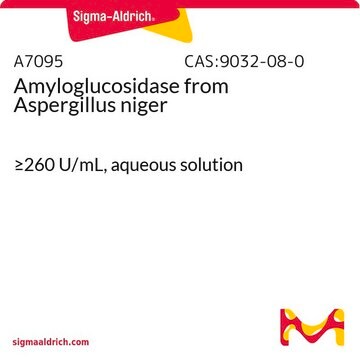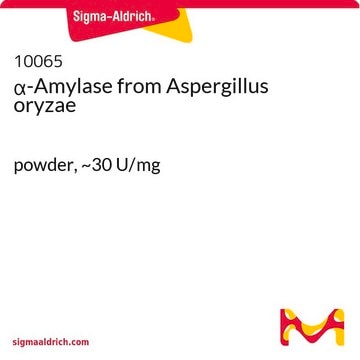A4551
α-Amylase from Bacillus licheniformis
lyophilized powder, 500-1,500 units/mg protein, 93-100% (SDS-PAGE)
Synonym(s):
1,4-α-D-Glucan-glucanohydrolase
About This Item
Recommended Products
biological source
Bacillus licheniformis
Quality Level
Assay
93-100% (SDS-PAGE)
form
lyophilized powder
specific activity
500-1,500 units/mg protein
mol wt
58-62 kDa
composition
Protein, 60-80% BCA
greener alternative product characteristics
Waste Prevention
Design for Energy Efficiency
Learn more about the Principles of Green Chemistry.
sustainability
Greener Alternative Product
greener alternative category
, Enabling
storage temp.
2-8°C
Looking for similar products? Visit Product Comparison Guide
General description
Unit Definition
Physical form
substrate
Signal Word
Danger
Hazard Statements
Precautionary Statements
Hazard Classifications
Resp. Sens. 1
Storage Class Code
11 - Combustible Solids
WGK
WGK 3
Certificates of Analysis (COA)
Search for Certificates of Analysis (COA) by entering the products Lot/Batch Number. Lot and Batch Numbers can be found on a product’s label following the words ‘Lot’ or ‘Batch’.
Already Own This Product?
Find documentation for the products that you have recently purchased in the Document Library.
Customers Also Viewed
Protocols
Follow our procedure for the determination of alpha-Amylase activity. This enzymatic assay of a-Amylase guides you through the entire process and necessary calculations.
Our team of scientists has experience in all areas of research including Life Science, Material Science, Chemical Synthesis, Chromatography, Analytical and many others.
Contact Technical Service












